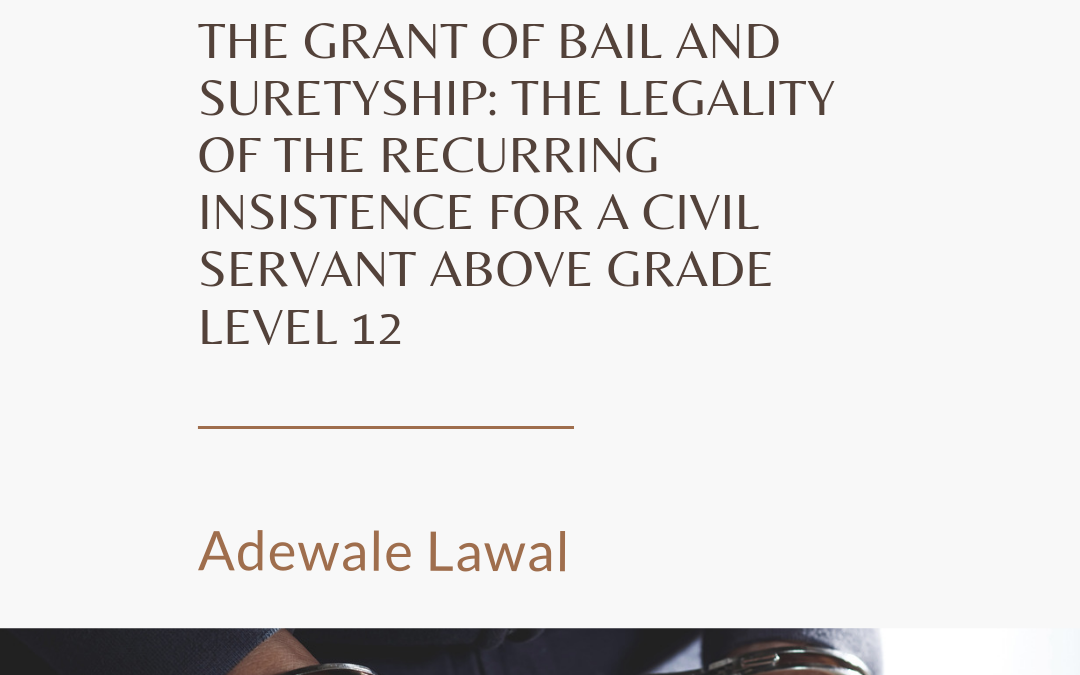The Grant Of Bail And Suretyship: The Legality Of Recurring Insistence For A Cicil Servant Above Grade12.
Bail is a conditional right guaranteed under Section 35 of the 1999 5⅚no hfsConstitution of the Federal Republic of Nigeria (as amended) (“Constitution”). Elementarily, bail is the temporary release of a defendant pending investigation or trial except for offences punishable by death which require proof of special conditions and circumstances.
The Nigerian criminal justice system recognizes three instances where a defendant can be admitted to bail and they include:
• a suspect may be granted bail by the police at the police station (administrative)
• a defendant may be granted bail by the court pending trial, and
• a convict may be granted bail pending the determination of his appeal.
This conditional release of an accused is anchored on the constitutional acclamation that any person charged with a criminal offence is presumed innocent until otherwise proven guilty. See: Section 36 (5) of the 1999 Constitution of the Federal Republic of Nigeria (as amended).
Bail may be granted by the court, the police or other enforcement agencies where a suspect or defendant is brought before it. Both the Court and the Police have the power to release a suspect or a defendant on bail under the various Administration of Criminal Justice Laws (ACJL) applicable in the South and the Nigerian Criminal Procedure Code (CPC) applicable in the North.
As a condition for the grant of bail, a suspect or a defendant may be required to enter into an undertaking that he will be present anytime he is required to do so at the Police Station or whenever his case comes up in court based on self-recognizance, or to provide a surety for his temporal release.
The Black’s Law Dictionary 11th Edition defines “Surety” as: A person who is primarily liable for the payment of another’s debt or the performance of another’s obligation.
In the case of a bail, the surety undertakes to provide security for the release of the defendant on the promise that the defendant will honor the terms of the bail agreement by appearing in court or the police station as at when required.
It is needless to say that the role of a surety is very important in a bail process because of the risk associated with a defendant being set free or at large while his case is pending. It is therefore very important to have credible surety to stand as a guarantor that the defendant will attend court after he is released on bail. This will mitigate the risk that the defendant will escape prosecution by “jumping bail”.
2
Courts and Security agencies have over the years adopted the practice of imposing stringent requirements in relation to status and qualifications of persons who are eligible to stand as sureties to a suspect or a defendant in criminal matters. For example, they often require that sureties must be high ranking Federal or State Civil Servant. This practice is not in conformity with our extant laws, and in particular, the Constitution.
A careful perusal of all laws guiding the prosecution of a defendant particularly the Sections which covers (Bail & Recognizances) of the Criminal Justice Law of each States, leads to the inevitable conclusion that there are no provisions in the Laws that mandates or requires a surety to be a Civil Servant of any grade level in a Federal or State Ministry.
This strange requirement that a surety must be a Federal or State Civil Servant mostly above Grade level 12 in any Ministry has led to the unwarranted and continuous detention of defendants in correctional facilities and in some cases led to untimely death without proper prosecution.
Over the years, Nigerian Correctional Facilities have become congested as a result of many defendant’s inability to perfect their bail due to these stringent conditions.
It is necessary to state clearly, that a grant of Bail to a defendant is not an escape from Justice, but affords the defendant an opportunity to have access to necessary facilities for the preparation of his defence against the petition/charge proffered against him, giving cognizance to Section 36 (5) of the 1999 Constitution of the Federal Republic of Nigeria.
It is settled in plethora of cases, with the most recent being Dasuki v. Director General State Security & Ors (2019) LPELR-48113 (CA) wherein the Court of Appeal set aside the conditions of bail granted to the defendant for being too excessive and stringent.
Generally, it is against the spirit of the Constitution to impose excessive and stringent conditions for bail such as imposing Federal or State Civil Servant mostly above Grade level 12 in any Ministry, as this will be tantamount to refusal of bail.
In conclusion, the trial courts, Police and other enforcement agencies are enjoined to be liberal in their approach to grant of bail and the conditions thereof in non-capital offences. They are thus to grant bail on favorable and affordable conditions as this conforms with the principles of fair hearing, presumption of innocence and this will decongest Nigerian Correctional Facilities.
Adewale Lawal, Esq.
(Managing Partner)
Adewale Lawal & Co.
Adewale Lawal is a graduate of Olabisi Onabanjo University, Ago-Iwoye, Ogun State and the Managing Partner of Adewale Lawal & Co. Adewale has consistently demonstrated a passion for law practice. His exceptional understanding of legal issues reflects in his output in and out of Court. A passionate thinker and writer, his articles on a wide range of legal issues have been published in reputable local law journals.

